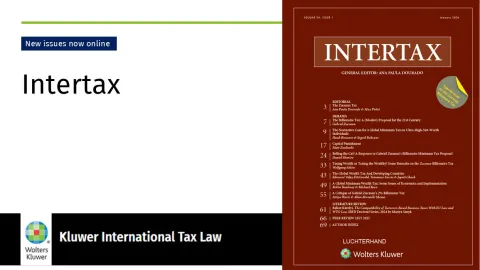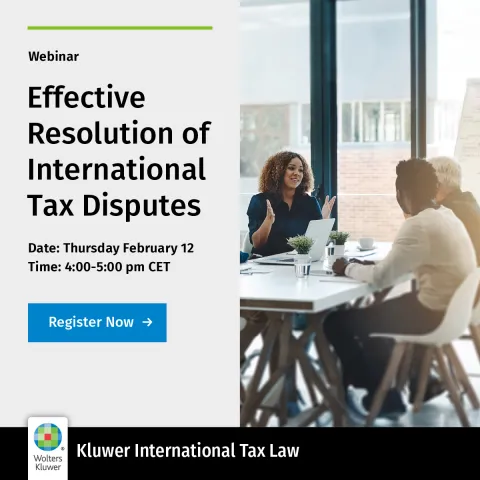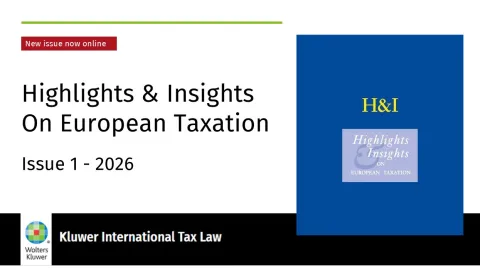Paper does not give rise to a Permanent Establishment
July 24, 2025
The Luxembourg High Administrative Court has rejected an appeal against a first instance decision that a holding company resident in Luxembourg had no permanent establishment in Malaysia within Article 5 of the Luxembourg- Malaysia Double Tax Treaty.
In Cour Administrative, Case no. 50602C, of 17 June 2024, A Luxemburg company (PSC) was formed by a corporate group in order to acquire the shares of two further companies. Some six months later, the shares in the target companies were acquired on fulfillment of a condition precedent in two share purchase agreements concluded shortly after the company was formed. Financing for the acquisitions was by way of interest free loans from another group company.
The taxpayer, PSC, contended that the transactions and ownership of the two companies it acquired it were attributed to a permanent establishment it had in Malaysia. Article 24 of the Treaty (patterned on article 23A of the OECD Model) provided that Luxembourg must exempt a Luxembourg resident- from both corporate income tax and capital tax if the treaty permitted Malaysia to tax those items. It was further contended that the permanent establishment existed from the time the shares in the two companies were acquired. Although the residence of the target companies was not identified in the decision, the Malaysian tax authorities accepted that PSC had no Malaysian source income and was not taxable there.
The taxpayer’s case floundered mostly because of the lack of evidence and contradictions in the evidence on the existence of a permanent establishment in Malaysia. Nonetheless, the case provides useful insights into the requirements for a permanent establishment.
PE requirements
The court observed that the existence of a physical permanent establishment in this case, must be determined by refence to the combined requirements set out in Article 5 paragraphs (1) – a fixed place of business, (2)(b)- a branch, and (c)- an office, as well as 4(e) - activity of a preparatory or auxiliary character, of the Treaty.
Referring to OECD Commentary, the essential characteristics of a PE identified by the court were: (i) of a place of business, that is to say, a physical facility which may, in particular, take the form of a branch or an office, (ii) the fixed nature of this place of business, that is to say, (a) it must be established in a specific place and (b) be characterized by a certain degree of permanence, and (iii) the exercise of all or part of the activity of the enterprise in question through the facility in the sense that persons carry on the activity in the State where the fixed place is situated. Furthermore, (iv) activity that is not preparatory or auxiliary.
Two requirements for a permanent establishment were central to the case: a distinct geographic location; and the carrying on of business at that location.
Distinct geographic location
The Group owned all or part of three office towers in a complex in Malaysia. The taxpayer argued that the office space allocated to the branch could change from one tower to another depending on the operational needs, and that, therefore, the three towers should be considered a single site.
The court accepted that it is plausible that the allocation of an office to a branch within a complex consisting of three towers could vary over time, the fact remains that such an office had to be clearly identified at all times. This was not the case on the evidence, which was contradictory about the location: There was inconsistency in the address for service in key documents: the loan agreements and a Service Level Agreement (discussed below); and the evidence mostly related to periods several years after the tax year in question.
At the disposal of the enterprise
The court did not deal with the question whether any premises were at the disposal of the taxpayer or when premises might be at the disposal of an enterprise. Give the fact that, on the evidence, there was no identifiable fixed place, this is unsurprising. Evidence presented to the court on the location of the fixed place was in the form of its application a sketch of a floor in one of the towers which was said to contain the office of its permanent establishment would not suggest any form of entitlement to, or control over, the premises.
Business carried on
The taxpayer concluded a Service Level Agreement (SLA) with another group company which, the court accepted, had a branch in Malaysia, through an office equipped with office furniture, a telephone, a computer and a printer, internet access, and storage space, plus an employee of that company responsible for management of its branch.
The court accepted that a company does not need a large staff to manage two holdings, but considered that someone must nevertheless perform genuine management activities, even if limited. There was no evidence to this effect.
The Court noted that the case was ‘marked by a history of services provided solely on paper”. A transfer pricing report for 2016, stated that the taxpayer, PSC, was to provide various services to the group company (that was to provide services pursuant to the SLA) but never provided the services in question, as it did not have any employees of its own in Luxembourg. The services to be provided to the taxpayer’s alleged branch were to include "assisting in preparing monthly management accounts and collating performance reports on a monthly basis" and several other tasks involving the preparation of accounting documents and written communications. No documents were provided to show that these tasks were actually performed and there was no evidence of payment of the service fee by the branch. Registration of a branch in Malaysia for Malaysian corporate law requirements was undertaken some six years after the tax year in question as was the opening of a branch bank account and recruitment of an employee ‘to strengthen the local structure’. The evidence cast serious doubt on the reality of the services provided for in the SLA and, therefore, on the reality of the business establishment.
View of by the Malaysian authorities
Little weight was given by the court to confirmation of the existence of the branch by the Malaysian tax authorities given without the basis for that confirmation. Furthermore, the confirmations were issued years after the tax year in question and did not expressly refer to that year.
Tax plan
The reason for the attempt to set up a permanent establishment to hold interests in active companies was the inability of the taxpayer to benefit from the parent-subsidiary regime in Luxembourg. It was apparent that no Malaysian tax was payable.
The court found it unnecessary to consider the Luxembourg tax authorities argument that the arrangement was abusive. Perhaps the last word on the case is that of Canadian Tax Court Judge, Campbell J. Miller, in Antle v The Queen, 2009 TCC 465 (CanLII), when he said “it is not enough to have brilliant strategy, you must have brilliant execution.”
You may also like








